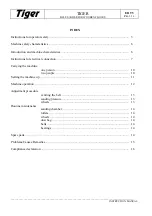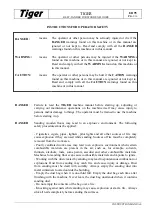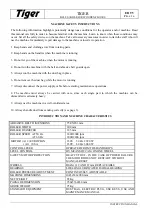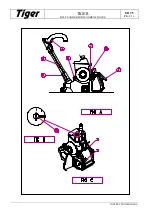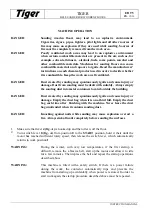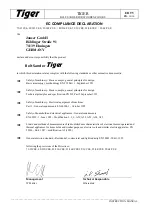
TIGER
BELT-SANDER FOR WOODEN FLOORS
ED 95
PG.
12/16
INSTRUCTION MANUAL
MACHINE OPERATION
DANGER
:
Sanding wooden floors may lead to an explosive environment.
Cigarettes, cigars, pipes, lighters, pilot lights and all other sources of
fire may cause an explosion if they are used while sanding. Sources of
fire must be completely removed from the work area.
DANGER
:
Poorly ventilated work areas may lead to an explosive environment
when certain combustible materials are present in the air, such as, for
example, solvents, thinners, alcohols, fuels, some paints, sawdust and
other combustible materials. Machines for sanding floors can cause
combustible materials and vapours to ignite. Read the manufacturers'
instructions on each chemical product used in order to decide whether
it is combustible. Keep the work area well ventilated.
DANGER:
Dust created by sanding may spontaneously ignite and cause injury or
damage. Dust from sanding must be dealt with suitably. Always empty
the sanding dust into metal containers located outside the building.
DANGER:
Dust created by sanding may spontaneously ignite and cause injury or
damage. Empty the dust bag when it is one-third full. Empty the dust
bag each time after finishing with the machine. Never leave the dust
bag unattended when it contains sanding dust.
DANGER:
Knocking against nails while sanding may cause explosion or start a
fire. Always sink all nails completely before sanding the surfaces
.
1.
Make sure that lever
4 (fig. A)
is hooked up and the roller is off the floor.
2.
Turn switch lever
8 (fig. A)
from position
0
to the
START
position, hold it their until the
motor has reached sufficient rotary speed, then release the switch lever, which automatically
returns to work position
1
.
WARNING:
During the winter, with very low temperatures, if the first startup is
difficult, remove the abrasive belt, start up the motor and allow it to idle
for a few minutes. Then replace the belt and repeat the startup operations
described above.
WARNING:
This machine is fitted with a safety switch. If there is a power failure
during the work, the contactor automatically trips and prevents the
machine from starting up accidentally when power is restored. In order to
start work again, the startup procedure described above must be repeated.


